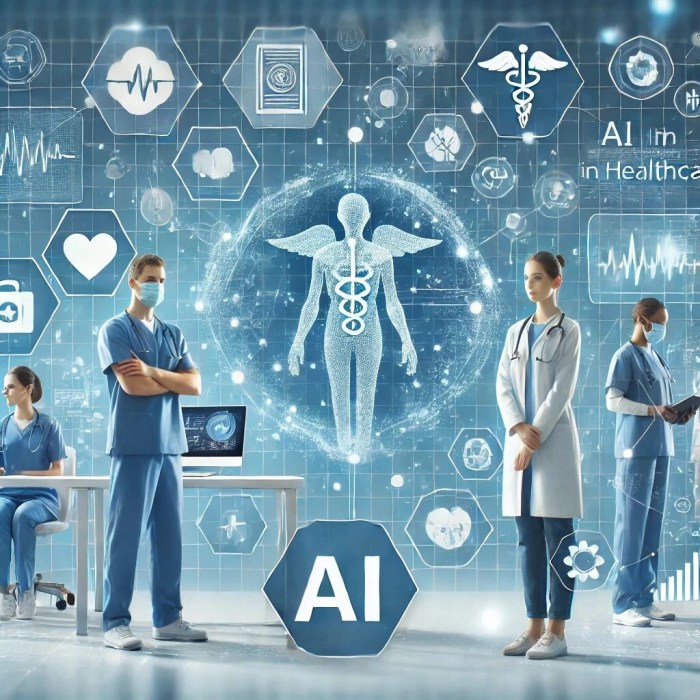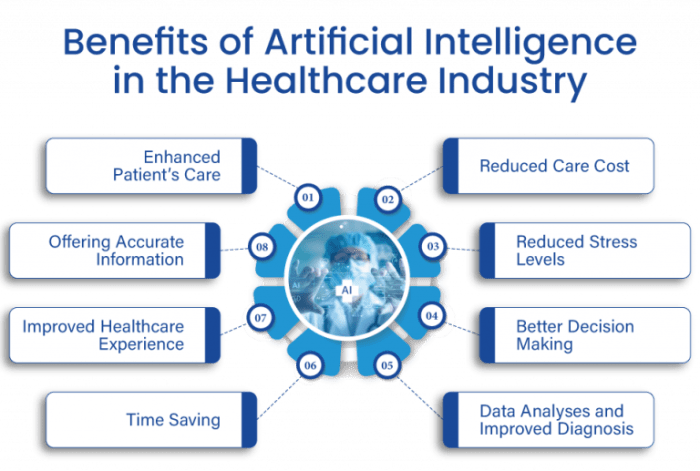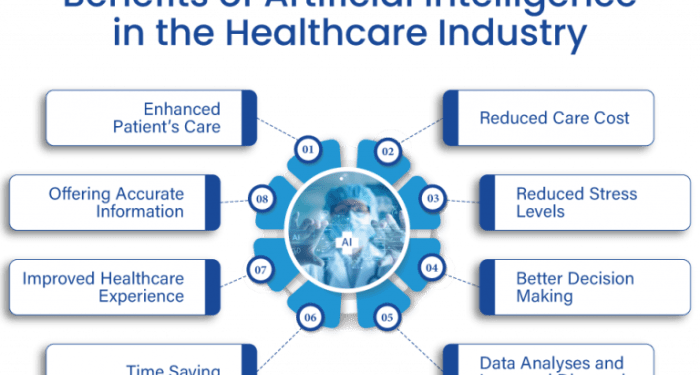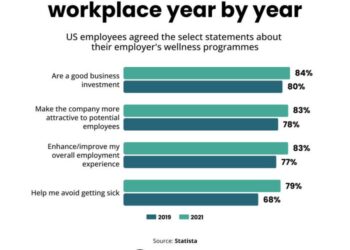Delving into AI in healthcare: What it means for patients, this introduction immerses readers in a unique and compelling narrative, with casual formal language style that is both engaging and thought-provoking from the very first sentence.
As we explore the impact of AI in healthcare, we uncover a world where technology intersects with patient well-being, revolutionizing the way medical care is delivered and received.
The Impact of AI in Healthcare
AI technology is revolutionizing the healthcare industry, offering innovative solutions to improve patient care and outcomes. By leveraging the power of artificial intelligence, healthcare providers can enhance diagnostic accuracy, streamline administrative tasks, and personalize treatment plans for patients.
AI Applications in Healthcare
- Diagnostic Imaging: AI algorithms can analyze medical images such as x-rays, MRIs, and CT scans to detect abnormalities and assist radiologists in making more accurate diagnoses.
- Predictive Analytics: AI can analyze patient data to predict potential health risks, enabling early intervention and personalized preventive care.
- Virtual Health Assistants: Chatbots and virtual assistants powered by AI can provide patients with round-the-clock support, answering questions, scheduling appointments, and offering medical advice.
Improvements in Patient Outcomes
- Enhanced Accuracy: AI technologies can help reduce diagnostic errors and ensure that patients receive timely and accurate diagnoses, leading to improved treatment outcomes.
- Personalized Treatment Plans: By analyzing individual patient data and medical history, AI can help healthcare providers tailor treatment plans to each patient's unique needs, optimizing outcomes and reducing risks.
- Efficient Healthcare Delivery: AI-powered tools can streamline administrative tasks, optimize hospital workflows, and improve patient care coordination, ultimately enhancing the overall quality of care and patient experience.
AI Tools for Diagnosis and Treatment

AI technology has revolutionized the healthcare industry by providing innovative tools for diagnosis and treatment. By leveraging machine learning algorithms and data analysis, AI can offer faster and more accurate solutions to healthcare challenges, ultimately improving patient outcomes.
AI in Faster and More Accurate Diagnosis
AI algorithms are used to analyze complex medical data such as imaging scans, genetic information, and patient records to assist healthcare professionals in making accurate diagnoses. For instance, AI-powered systems can quickly identify patterns in medical images like X-rays and MRIs, helping radiologists detect abnormalities that may be missed by the human eye.
This not only speeds up the diagnosis process but also reduces the risk of misdiagnosis.
AI in Treatment Planning
AI algorithms play a crucial role in treatment planning by analyzing large datasets to predict the most effective treatment options for patients. For example, AI can recommend personalized treatment plans based on a patient's genetic makeup, medical history, and specific health conditions.
This tailored approach ensures that patients receive the most suitable and targeted therapies, leading to better treatment outcomes.
AI in Personalized Medicine and Targeted Therapies
Personalized medicine involves customizing medical treatments to individual patients based on their genetic characteristics and unique health profiles. AI enables healthcare providers to identify biomarkers, genetic mutations, and other factors that can influence treatment response, allowing for the development of targeted therapies that are tailored to the patient's specific needs.
This personalized approach not only improves treatment efficacy but also minimizes side effects and enhances patient satisfaction.
Enhancing Patient Care and Experience

AI technologies play a crucial role in enhancing patient care and experience in healthcare settings. By leveraging AI-driven tools, healthcare providers can improve patient engagement, communication, and overall satisfaction.
Improved Patient Engagement and Communication
AI technologies help streamline communication between patients and healthcare providers, leading to better engagement and understanding of medical conditions. Chatbots and virtual health assistants powered by AI can provide personalized information, answer queries, and offer support to patients in real-time.
AI-Driven Tools for Enhanced Patient Experience
- Virtual Nurses: AI-powered virtual nurses can assist patients with medication reminders, follow-up appointments, and provide educational resources.
- Patient Monitoring Systems: AI-based monitoring systems can track patient vital signs and alert healthcare providers in case of any abnormalities, ensuring timely intervention.
- Personalized Treatment Plans: AI algorithms can analyze patient data to create personalized treatment plans, improving outcomes and reducing the risk of errors.
Impact on Patient Satisfaction and Quality of Care
AI technologies contribute to higher patient satisfaction by reducing wait times, minimizing errors, and enhancing the overall quality of care. Patients benefit from faster diagnosis, personalized treatment options, and improved communication with healthcare providers, leading to a more positive healthcare experience.
Privacy and Ethical Considerations
In the realm of AI in healthcare, ensuring patient data privacy and upholding ethical standards are crucial aspects that must be carefully considered.
Importance of Patient Data Privacy
Protecting patient data privacy is paramount when utilizing AI in healthcare applications. By safeguarding sensitive information such as medical records and personal details, patients can trust that their data is secure and not misused.
Ethical Implications of Using AI in Patient Care
Integrating AI in patient care raises ethical concerns regarding issues like accountability, transparency, and bias. Healthcare providers must navigate these challenges to ensure that AI is used responsibly and ethically to benefit patients.
Regulations and Guidelines Governing AI Use in Healthcare
- Regulatory bodies like the FDA in the United States and the European Commission have established guidelines for the development and deployment of AI technologies in healthcare to protect patient safety and data privacy.
- The General Data Protection Regulation (GDPR) in Europe sets strict standards for data protection and privacy, impacting how AI systems handle patient information.
- Ethical frameworks such as the Hippocratic Oath and the AMA Code of Medical Ethics provide guidelines for healthcare professionals using AI to ensure patient welfare remains the top priority.
Future Trends and Possibilities
Artificial Intelligence (AI) in healthcare is poised to continue its rapid evolution, bringing about significant changes in patient care. As technology advances, the future holds exciting possibilities for how AI will further revolutionize the healthcare industry.
Advancements in AI and Patient Care
- AI-powered predictive analytics will enhance early disease detection, allowing for timely interventions and personalized treatment plans.
- Machine learning algorithms will continue to improve diagnostic accuracy, leading to more precise and efficient healthcare outcomes.
- Virtual health assistants and chatbots will play a crucial role in providing 24/7 patient support and guidance, improving overall patient experience.
Challenges and Limitations of AI Integration
- Privacy concerns and data security issues may arise with the increased use of AI in healthcare, requiring robust safeguards to protect patient information.
- Ensuring the ethical use of AI algorithms and preventing biases in decision-making processes will be crucial to maintain trust in AI-driven healthcare solutions.
- Resistance from healthcare professionals to adopt AI technologies due to concerns about job displacement and the need for upskilling may pose challenges to widespread implementation.
Role of AI in Preventive Medicine and Wellness Programs
- AI-powered predictive modeling can help identify individuals at high risk for certain health conditions, enabling proactive interventions and preventive measures.
- Personalized wellness plans based on AI-driven insights can empower individuals to take control of their health and make informed lifestyle choices.
- Integration of AI in wearable devices and mobile health applications will enable continuous monitoring of health metrics, promoting early intervention and preventive care.
Epilogue

In conclusion, AI in healthcare holds immense promise for patients, offering a glimpse into a future where personalized, efficient, and effective care is the norm. As we navigate the evolving landscape of healthcare technology, the integration of AI continues to shape a brighter, more patient-centric healthcare system.
FAQ Overview
How is AI transforming the healthcare industry?
AI is revolutionizing healthcare by streamlining processes, improving diagnostic accuracy, and enhancing patient outcomes through personalized treatment plans.
What are the ethical implications of using AI in patient care?
The ethical considerations include maintaining patient data privacy, ensuring unbiased decision-making, and addressing potential societal impacts of AI integration in healthcare.
What role does AI play in personalized medicine and targeted therapies?
AI enables the analysis of vast amounts of patient data to tailor treatment plans based on individual characteristics, leading to more effective and precise interventions.











